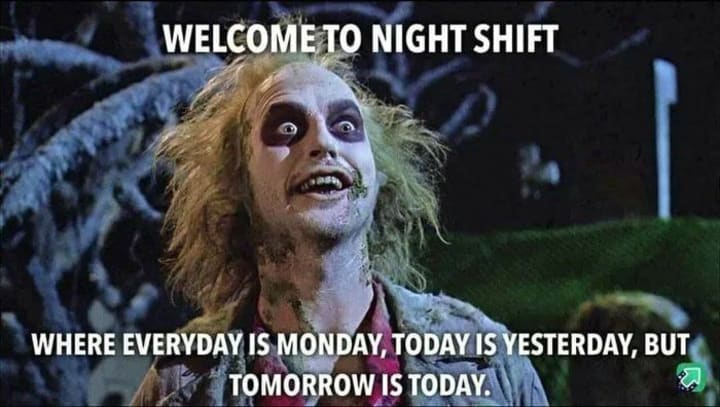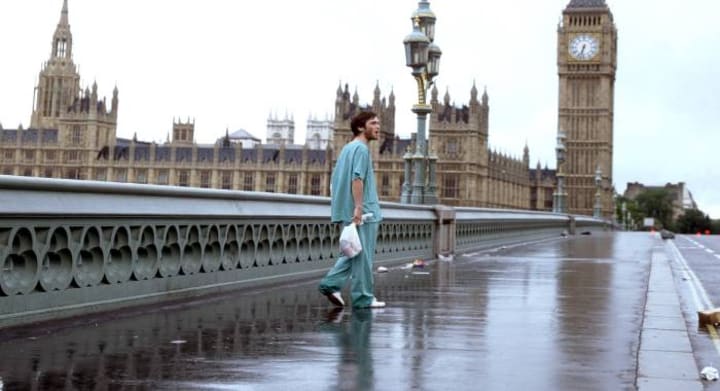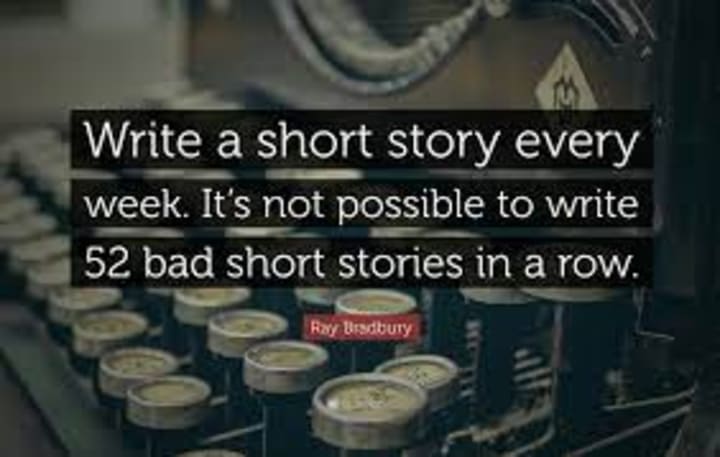The Psychiatric Ward and Vocal
Finding the Flow With Help From Vocal

This piece marks a milestone: 100 articles.
100 different snapshots of my mind. From horror short stories to silly items about dogs to explorations of why I believe The Beatles are the greatest musicians who have ever existed to poems I would never have dreamed of writing.
Although my stats might not agree, I believe I've become a better, more rounded writer with those 100 articles.
More importantly, I've also become a better person. Healthier.
And that's the part that really matters.
Because that's why I found myself on Vocal in the first place.
Having always dreamed of being a writer, I came here to stretch those authorial muscles that had atrophied over the preceding years. But, that was my secondary aim. Primarily, I came here to grow as a person and to make sense of a life that - a few years ago - had spun out of control.
A Temporary Loss of Sanity
In October 2019, I spent two weeks in a psychiatric ward.
Looking back now, there was a grim inevitability about my admission.
For, trust me, 2019 was awful.
It was a grim, grim 12 months. The worst of my life.
Why? Well, there were lots of things but a summary would run as follows:
Although it had been three years since my divorce, and three years since I’d stopped being a stay-at-home dad, I still struggled not seeing my daughters every day and missed them with a pain I cannot describe...
My job – although worthy – was also back-breaking, and drained me, emotionally and physically….
I was also working nights, which meant an irregular sleeping pattern that was very visibly affecting my mental well-being…

And as my job paid poorly, I was also constantly worried about money…
Due to the double whammy of working nights and a limited budget, I’d socially isolated myself. I hadn’t meant to, I wasn’t even aware I had; it just… well, it just kind of happened. But it got to the stage where, at one point, I could go weeks without having a meaningful conversation with another adult…
I also had to move. On the surface this was a good thing; my new flat was modern, light and spacious, whereas my old house was so shabby that even the Addams Family would’ve turned their noses up at it. However, having to balance work, childcare, and moving (which is never fun at the best of times) was a bit too much for fragile old me…
Then there was my love life. We were the ultimate recycling couple, trapped in a dysfunctional merry-go-round of make-up - break-up - make-up - break-up.
We loved each other - of that there was no doubt - but could we make it work? No, we could not. Looking back now, a very large part of me isn't surprised; the number of fires we both had to put out in our own lives whilst we were together was, quite frankly, absurd. Each week brought a new problem for us to deal with; if either one of us weren't at our best in the time we knew each other, then that's understandable given just how much we were both trying to juggle.
But, that continual on-off-on-off pattern exhausted me. Given everything else that was happening, it was, unarguably, the last thing I needed. My emotional energy was already limited; despite the love we had for each other, the actual nature of the relationship left me depleted.
And there was my depression.
I hope I don’t have much in common with the now-deceased, Florida-based, fictional serial killer Dexter, but I’ve always liked the elegant way he described his mental illness; he called it his ‘dark passenger.’ For, depression is my ‘dark passenger’ (granted, mine just tends to make me curl up on the sofa for days as opposed to gruesomely mutilating people, but each to their own).
Most of the time my passenger is a well-behaved, pretty silent, fellow traveller. However, when things in my life start to go askew, he begins to speak up. And given where my life had sunk to by the tail-end of 2019, he had lots to shout about…
Inexorably, I had a breakdown.
In reality, this had been brewing for years - decades even. I'd been skating on very, very thin ice for a very, very long time, and had been flirting with full-on mental disintegration for ages; at the end of last year I simply finally, at long last, consummated the relationship.
There was nothing histrionic or exciting about any of it.
There was no flamboyant head-shaving in the full glare of the world’s media a’la Britney. Outwardly, it was all distinctly low-key. You could almost say it was a very British breakdown. One night I sat on my sofa and realized I had nothing left to give. I was empty. Spent. A shell of a man. An echo of who I used to be (though, to be honest, I'd been that shell, that echo for years).
That night, I thought about suicide.
Now, I’d considered this before - I’m a depressive, of course, I had. But, as mental health experts will tell you, there’s a huge difference between suicidal ideation (where you simply think about ending your life in abstract terms, e.g. "I'd be better off dead"), and suicidal intent (where you actually plan how you would do it, e.g. "that neck-tie would do the job"). The former is (obviously) unhealthy, but not necessarily dangerous; the latter is just downright wrong, and a key indicator that you’re hurting and need help.
And, that night, for the first time, I was distinctly in the latter camp. So much so that, at one point, I genuinely didn’t know if I’d ride that storm out, and simply go to bed, or hang myself.
What saved me was, ironically, one of the things that had brought me to that place: My last job.
For eighteen months I’d worked as a Mental Health Support Worker. It was a rewarding but brutal vocation. One that, given my own mental well-being, I should never have been anywhere near in the first place.
But, it proved to be my salvation.
In Crisis
A lot of the clients I’d supported regularly had their own long dark nights of the soul, and it had been my job to help them through them. The procedures were fixed. First, just listen - it was that simple: just be there and show them someone cared. You'd be amazed at how effective that can be. However, if that didn’t work, it was time to involve the NHS - namely, the local Mental Health Crisis Team.
This had happened so often, that it had become second nature to me - the mere mention of the word ‘suicide’ evoked a Pavlovian reaction in me: ‘Crisis Team.’ And, without thinking, it was to those people I turned when I had no hope left.
I was admitted to a psychiatric ward twenty-fours later.
There is a lot to be said about that. To be honest, there’s a frightening amount. Most of which would be positive.
Yes, mental health provision in the UK is underfunded and stretched to breaking point. But the people who work within it are simply astonishing. From the mental health nurse who triaged me, to the cook who always gave me extra chips with my evening meal, I have never encountered such compassion and kindness as I did on the ward (they’re also very good at sticking a rocket up your backside when needed).
And as for the other patients? I can't lie; initially, a few scared me. Some mental illnesses are more 'overt' than others. Whereas mine makes me quieter and more withdrawn, other conditions have the opposite effect. And it took me a few days to get used to the occasional bursts of loudness and bedlam. However, like the staff, there was not one patient who didn't treat me with sympathy and respect.
On a much more selfish note, it helped me see how other people - in my everyday life - perceived me. Although I had worked in the field of mental health, I had never spent much time with other people with depression. But, being on the ward, with lots of people who also had depression, enabled me to see how hard my mental illness must have been for people close to me to deal with.
I suppose I'd just never considered it all before, but, during those fourteen days, I experienced - for the first time - what it was like for someone else to suddenly pull away, and shut down; for someone else to be full of self-hate, and fail to see their worth, despite the fact that, from my perspective, they were an utterly decent person. They were also me.
Lots of things happened that changed my perspective of my mental illness, but those insights were the greatest.
There's - undoubtedly - a vast amount more to say about all that. But, for now, all I do want to say is this: Those two weeks saved me.
They cost me a lot, personally. Things that I’m still counting the cost of. But I’m still here. And that’s in no small part due to the ward, and the people I met there.
Anyway…
Fourteen days later, I was discharged.
Life was different. Had never been more different. Although it had only been two weeks, my lovely flat now seemed thoroughly alien to me. As did going to the shop. Or the bank. Or… everything, really. Liverpool had never seemed so, so strange. It might sound trite, but - for a short time - I felt like Cillian Murphy's character Jim in '28 Days Later.'

After leaving the hospital, I didn't find myself in a virus-ravaged, post-apocalyptic London, but Merseyside certainly seemed unworldly and strange, to me.
But, although still low, I was nowhere near as beaten as I had been a fortnight earlier. I was okay. Not brilliant, but okay - and I’d take that. Armed with my okay-ness, I slowly, step by step, began rebuilding my life.
Over those strange first few months, my life (overall) stabilized, and even improved in some areas. There were still huge things to deal with (and one person's absence - her name begins with the letter ‘A’ - left a void that was proving impossible to fill). But I was okay. Life was getting better…
… But not by much and not steadily.
I wasn't permanently sad anymore but I also wasn't consistently happy.
I was missing something.
In hindsight, this was pure naivete. I can see that now. To imagine that I would find contentment simply by taking anti-depressants, and baring my soul to the counsellor I’d started seeing was absurdly simplistic. All this was going to do was pull me out of the pit I was in, not turn my life around. To do that, I actually had to change my life.
But how?
In the absence of knowing, I did what any well-educated, reasonably intelligent person would do – I turned to the Internet.
Heading straight to the heart of the issue, I opened Google (other search engines are available, consumers), and typed in 'How to be happy.' Instantly, I was engulfed by a tsunami of advice. It took all forms: blogs by well-meaning amateurs espousing pseudo-Buddhist philosophy; heavily-scientific analyses of how our brains work composed by clinical psychologists - there's no shortage of stuff.
The really embarrassing thing was that most of it was new to me. It turns out I had been missing something. Quite a lot, actually; I really didn't know much about being happy (which, although a revelation to me, is probably the smallest surprise in the world to the people who know me well).
After a while, I realized I'd become slightly obsessed with the topic of 'Happiness.' It wasn't just because trawling through all this stuff became an enjoyable pastime in itself (simply put, reading about happiness made me happy), it was also because it was genuinely interesting. Not least as there was so much disagreement out there.
Admittedly, there's a huge amount of consensus about many things (e.g. people who view relationships with family and friends as being the most important aspect of their lives tend to be happier than those who see material goods as being the end-all).
But there are a lot of conflicts as well. Age, upbringing, gender, social class, nationality - all of these elements influenced a person's concept of what it meant to be happy. Definitions varied and that intrigued me.
But I also enjoyed my reading for the very reason I’d begun exploring this topic in the first place; it gave me ideas to try out.
One such idea was the concept of 'Following the Flow.'
Flow State
This is simply a fancy-pants way of describing that feeling you get when you're so happily engrossed in a task that any nagging, negative, sub-conscious thoughts are suppressed; something fairly useful if you want to be happy. You'll know when this has happened as you'll often lose track of time as you were so involved in what you were doing.
Whether it's pounding away on a drum kit or running around a rugby pitch smacking people or chatting with someone over a coffee or a pint, the time has flown - flown because you've been happily 'following the flow. '
The only problem was that, aside from spending time with my daughters, I didn't think I had anything I really enjoyed doing anymore, nothing where I could ‘follow the flow.’
But of course I did - the very same thing I'm doing right now; writing.
I'm not the greatest writer to have ever lived - whilst what I create is, sometimes, okay, the majority of the time it needs burning (and then burning again, just to make sure).
But, most of the time, I love it - it's one of the few things I can do and follow the flow. The issue has always been a shortage of topics to write about. Perhaps it's an indication of my limited abilities and imagination, but if I don't care much for the subject, my work is stilted and dull, and I struggle to take any pleasure in the process.
But, if the topic at hand interests me then my stuff is passable and it's fun. (And fun = happy, the very thing I’m trying to get more of.)
However, those kinds of passions are rare and I've always found them difficult to find. Except I had one now - my new-found obsession with what I could do to make myself happier. Two birds with one stone: That's a good (happy) start.
Another way to build happiness into your life is to set yourself goals.
No matter how trivial or daft they might seem to someone else, achieving your goals breeds happiness in the same way rabbits produces baby rabbits; rapidly. Attainable goals, that is - if your target is impossibly tough or too abstract, you're only destined to fail; happiness does not that way lie (as Yoda might phrase it).
Although it's not always healthy to put all of your proverbial eggs into one imaginary basket (the more things that are at stake, the greater the potential failure, and the larger the dose of unhappiness if something goes wrong), sometimes it's a risk worth taking if the rewards are big enough, or if you can tie a goal to something you love doing (i.e. 'following the flow').
So, I had my 'following the flow' task - writing; I just needed a goal. I knew I didn't just want to write, I wanted to do so regularly, and I wanted to actually finish projects (my hard drive is littered with half-completed sketches and short films - enough of that nonsense). It was then that I recalled a piece of advice the great Ray Bradbury gave to aspiring writers;

Substitute 'short story’ for ‘articles' (well, mainly articles; I do want to give the short story stuff a whirl as well) and I had my goal; one a week.
I only needed one final thing; an incentive.
I know me - my discipline is questionable. If I didn't have an incentive, I'd only slack off when I was tired, or low, or when there was a new episode of 'The Punisher' on Netflix. Saying I was going to produce one piece a week was all and well good but I needed a reason to do this, some degree of accountability.
Such as...
Publicly saying on social media I was going to post one article a week.
One article about whatever aspect of happiness I'd been exploring that week, and my attempts to try and implement it in my life. (Well, that and the occasional short story, of course.)
Yeah, that'd do it.
Except, it didn't turn out that way.
And I'm immeasurably glad it didn't.
A Different Journey
I was going evoke that 'flow state' to tap into my inner stream of happiness and - in turn - also write about being happy - that was my aim. If I had ideas for other pieces, then good. But this was fundamentally self-help; I was going to directly explore the mess my life - and mind - had become.
However, what I learned was that being direct was not always the most effective route to a destination. In short, something else came of that 'flow state.'
As my mind warmed up to the task, and the more I wrote, the more I began to get ideas for pieces that weren’t about mental health. Silly ideas about The Beatles, or my favourite movies, or fragments of short stories.
Eventually I gave in, and started to stretch my wings. Once more I was writing for the fun of it. And writing about topics that are themselves enjoyable.
Writing articles about the genius of Lennon and McCartney enabled me to dive back into the Fab Four's back catalogue - the hours I spent relistening to their music was as life-affirming as anything I ever wrote about managing depression.
Trying to compose daft vignettes about 'Star Wars' or about a stay in a holiday cottage that turned into a horror film forced me to see the funny side of life. As a depressive, writing comedy can be wonderfully cathartic - even if the piece isn't as humourous as you intended, deliberately forcing yourself to 'find the funny' does wonder for your mind.
But, most of all, I discovered that my fiction pieces about mental health actually helped me more than my non-fiction articles.
Two years ago, I was lucky to come 2nd in the 'Spooky Shorts' contest with my piece 'The New You.
I never planned it as an exploration of mental health - as a horror fan, I simply wanted to fulfil a dream of trying to write something scary and unsettling. And I think I succeeded.
But what also came out was years of self-loathing and failure. It was like lancing a boil that contained all my neuroses and feelings of inadequacy. Writing 'The New You' was a disturbing and uncomfortable experience. As such, it probably did more for me than any article in which I openly discussed mental health, depression, sadness, loneliness, or failure.
Metaphors have a primal power. If I'm doing better as a person now, putting myself into a short story and - indirectly - exploring my psyche has a huge amount to do with that.
Just as those frivolous articles about The Beatles, soccer, or TV shows have. Discovering that 'flow state' has been priceless - I'm still at my happiest when pounding a keyboard. But much more poured out of me thanks to finding the flow.
With every piece I've written I've learnt something about 'me.' Even if - superficially - it's not about 'me' in the slightest. Being in the flow has brought things to the surface I never even knew I needed to exorcise. It's spiritual colonic irrigation.
And I'm grateful for it.
The Future
My life is far from perfect.
There are still major issues to resolve, and bridges that need to be rebuilt. But I am finally doing 'okay.' And if that doesn't seem much then you have no idea about the hole I found myself at the bottom of three years ago.
However, a major reason for my current mental health being where it is is due to both finding that 'flow state' and what has come out whilst in it. Those 100 articles have helped me infinitely more than I ever thought they would.
And I am certain that the next 100 articles will be just as beneficial.
------------------------------------------------------------------------------
If you've liked what you've read, please check out the rest of work my on Vocal including my Top Story -
If you've really liked what you've read, please share it with your friends on social media.
If you've really, really liked what you've read, a small tip would be greatly appreciated.
Thank you!
About the Creator
Christopher Donovan
Hi!
Film, theatre, mental health, sport, politics, music, travel, and the occasional short story... it's a varied mix!
Tips greatly appreciated!!
Thank you!!






Comments
There are no comments for this story
Be the first to respond and start the conversation.